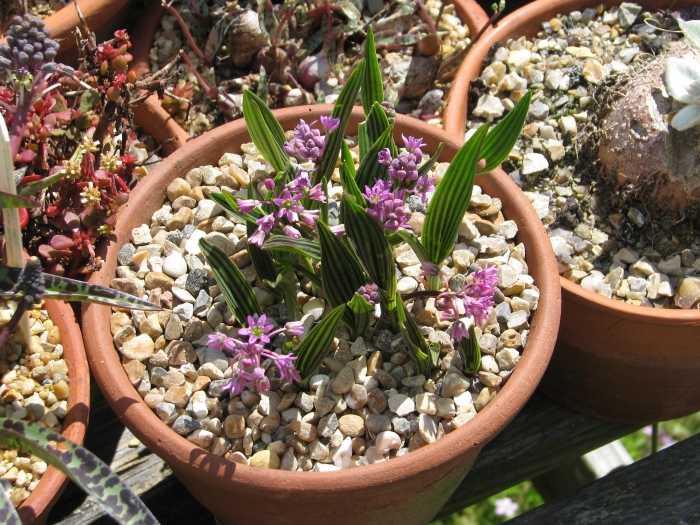Cooper’s False Squill
(Ledebouria cooperi)
Cooper’s False Squill (Ledebouria cooperi)
/
/

peganum
CC BY-SA 2.0
Image By:
peganum
Recorded By:
Copyright:
CC BY-SA 2.0
Copyright Notice:
Photo by: peganum | License Type: CC BY-SA 2.0 | License URL: https://creativecommons.org/licenses/by-sa/2.0/ | Uploader: peganum | Publisher: Flickr |














Estimated Native Range
Summary
Ledebouria cooperi, commonly known as Cooper’s False Squill, is a semi-deciduous perennial bulb native to eastern South Africa, where it thrives in seasonally dry woodland areas and rocky outcrops. It typically grows to a height of 0.3-0.4 feet (0.09-0.1 meters) and spreads up to 1 foot (0.3 meters). The plant forms rosettes of attractive, variegated leaves that are green with purple spots. In spring, it produces small, bell-shaped pink flowers on slender stalks, which add a delicate touch to the garden but are not particularly showy.
Cooper’s False Squill is valued for its foliage, which provides visual interest even when the plant is not in flower. It is suitable for rock gardens, as a ground cover, or in containers. It prefers a well-drained soil mix and can tolerate periods of drought once established. While it enjoys full sun to part shade, in hotter climates, some afternoon shade is beneficial. Overwatering should be avoided to prevent bulb rot. This plant is not known for aggressive roots or significant disease problems, making it a low-maintenance choice for gardeners. It is, however, sensitive to frost and requires protection in colder climates.CC BY-SA 4.0
Cooper’s False Squill is valued for its foliage, which provides visual interest even when the plant is not in flower. It is suitable for rock gardens, as a ground cover, or in containers. It prefers a well-drained soil mix and can tolerate periods of drought once established. While it enjoys full sun to part shade, in hotter climates, some afternoon shade is beneficial. Overwatering should be avoided to prevent bulb rot. This plant is not known for aggressive roots or significant disease problems, making it a low-maintenance choice for gardeners. It is, however, sensitive to frost and requires protection in colder climates.CC BY-SA 4.0
Plant Description
- Plant Type: Bulb
- Height: 0.3-0.4 feet
- Width: 0.75-1 feet
- Growth Rate: Moderate
- Flower Color: Pink
- Flowering Season: Spring
- Leaf Retention: Semi-Deciduous
Growth Requirements
- Sun: Full Sun, Part Shade
- Water: Medium
- Drainage: Medium
Common Uses
Drought Tolerant, Fragrant, Groundcover, Low Maintenance, Rock Garden, Showy Flowers
Natural Habitat
Seasonally dry woodland areas and rocky outcrops in the Eastern Cape Province of South Africa
Other Names
Common Names: Zebra’s Quill, Cooper’s False Scilla
Scientific Names: , Ledebouria cooperi, Scilla saturata, Scilla cooperi, Scilla conrathii, Scilla inandensis, Scilla aggregata, Scilla exigua, Scilla londonensis, Scilla rehmannii
GBIF Accepted Name: Ledebouria cooperi (Hook.f.) Jessop